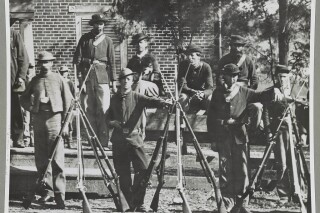Today in History: April 9, Lee surrenders to Grant

This April 1865 image provided by the Library of Congress shows Federal troops standing in front of the Appomattox Court House near the time of Confederate Gen. Robert E. Lee’s surrender to Union Lt. Gen. Ulysses S. Grant, in Appomattox, Va. (AP Photo/Library of Congress)
Today in History:
On April 9, 1865, Confederate Gen. Robert E. Lee surrendered his army to Union Lt. Gen. Ulysses S. Grant at Appomattox Court House in Virginia, effectively ending the U.S. Civil War after nearly four years.
On this date:
In 1413, the coronation of England’s King Henry V took place in Westminster Abbey.
In 1939, Marian Anderson performed a concert at the Lincoln Memorial in Washington, D.C., after the Black singer was denied the use of Constitution Hall by the Daughters of the American Revolution.
In 1940, during World War II, Germany invaded Denmark and Norway.
In 1942, during World War II, some 75,000 Philippine and American defenders on Bataan surrendered to Japanese troops, who forced the prisoners into what became known as the Bataan Death March; thousands died or were killed en route.
In 1959, NASA presented its first seven astronauts: Scott Carpenter, Gordon Cooper, John Glenn, Gus Grissom, Wally Schirra, Alan Shepard and Donald Slayton. Architect Frank Lloyd Wright, 91, died in Phoenix, Arizona.
In 1968, funerals, private and public, were held for Martin Luther King Jr. at the Ebenezer Baptist Church and Morehouse College in Atlanta, five days after the civil rights leader was assassinated in Memphis, Tennessee.
In 1979, officials declared an end to the crisis involving the Three Mile Island Unit 2 nuclear reactor in Pennsylvania, 12 days after a partial core meltdown.
In 1996, in a dramatic shift of purse-string power, President Bill Clinton signed a line-item veto bill into law. (The U.S. Supreme Court struck down the veto in 1998.)
In 2003, jubilant Iraqis celebrated the collapse of Saddam Hussein’s regime, beheading a toppled statue of their longtime ruler in downtown Baghdad.
In 2005, Britain’s Prince Charles married longtime love Camilla Parker Bowles, who took the title Duchess of Cornwall.
In 2010, Supreme Court Justice John Paul Stevens announced his retirement.
In 2012, a Florida special prosecutor said a grand jury would not look into the Trayvon Martin case, leaving the decision of whether to charge the teen’s shooter in her hands alone. (Prosecutor Angela Corey ended up filing second-degree murder charges against George Zimmerman, who pleaded not guilty, claiming self-defense; He was acquitted at trial.)
In 2013, 13 people were shot to death during a pre-dawn, house-to-house rampage in the Serbian village of Velika Ivanca; authorities identified the gunman as a 60-year-old veteran of the Balkan wars who took his own life.
In 2017, Sergio Garcia beat Justin Rose in a sudden-death playoff at the Masters for his first victory at a major championship.
In 2018, federal agents raided the office of President Donald Trump’s personal attorney, Michael Cohen, seizing records on matters including a $130,000 payment made to porn actress Stormy Daniels.
In 2021, Britain’s Prince Philip, husband of Queen Elizabeth II, died at the age of 99; he was Britain’s longest-serving consort.
In 2023, “The Super Mario Bros. Movie” would prove to be a surprisingly huge hit at the box office, bringing in $204.6 million in its first five days. (By year’s end, the animated film had earned more $1.3 billion globally, second only to “Barbie” for the year.)
